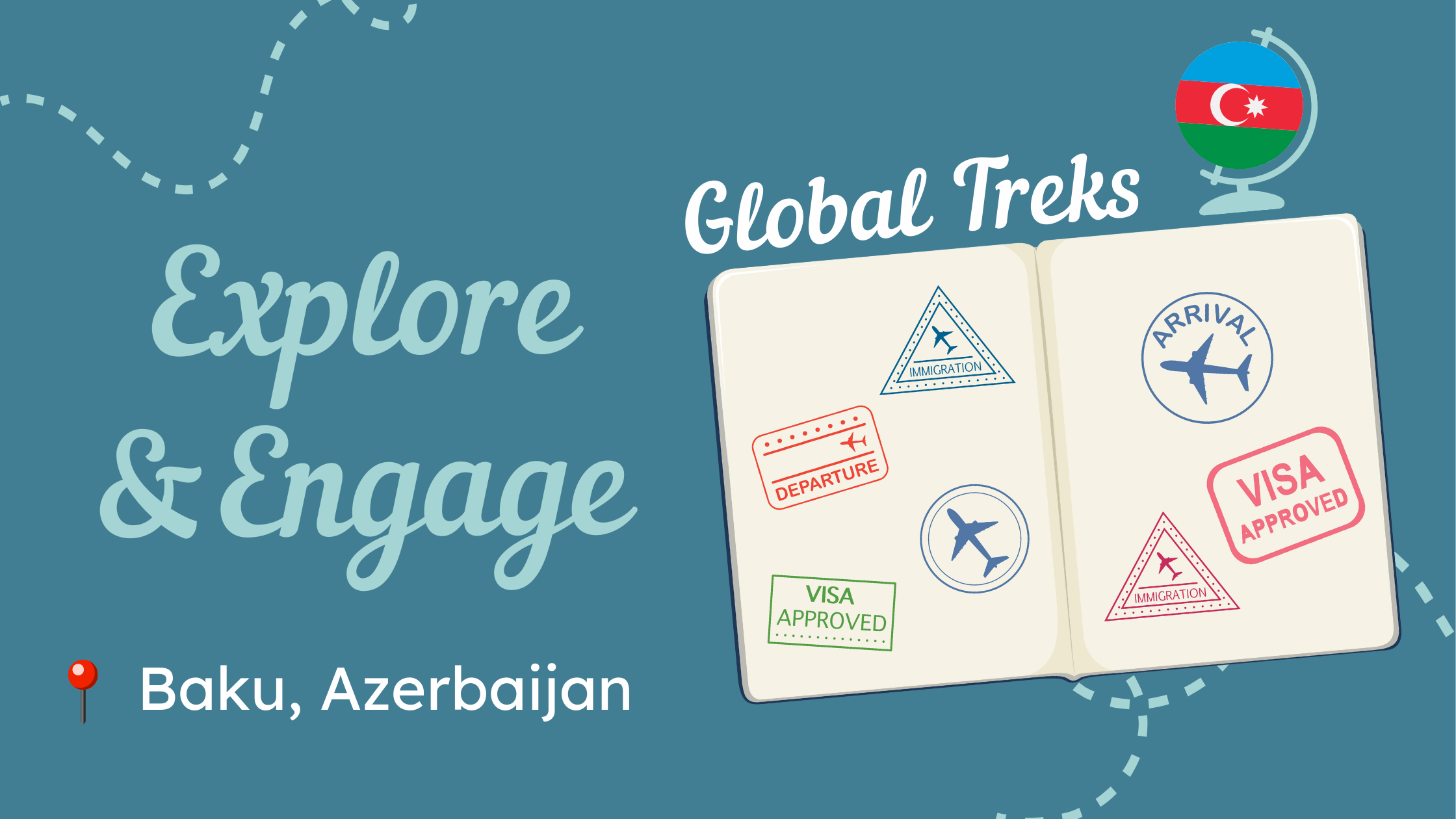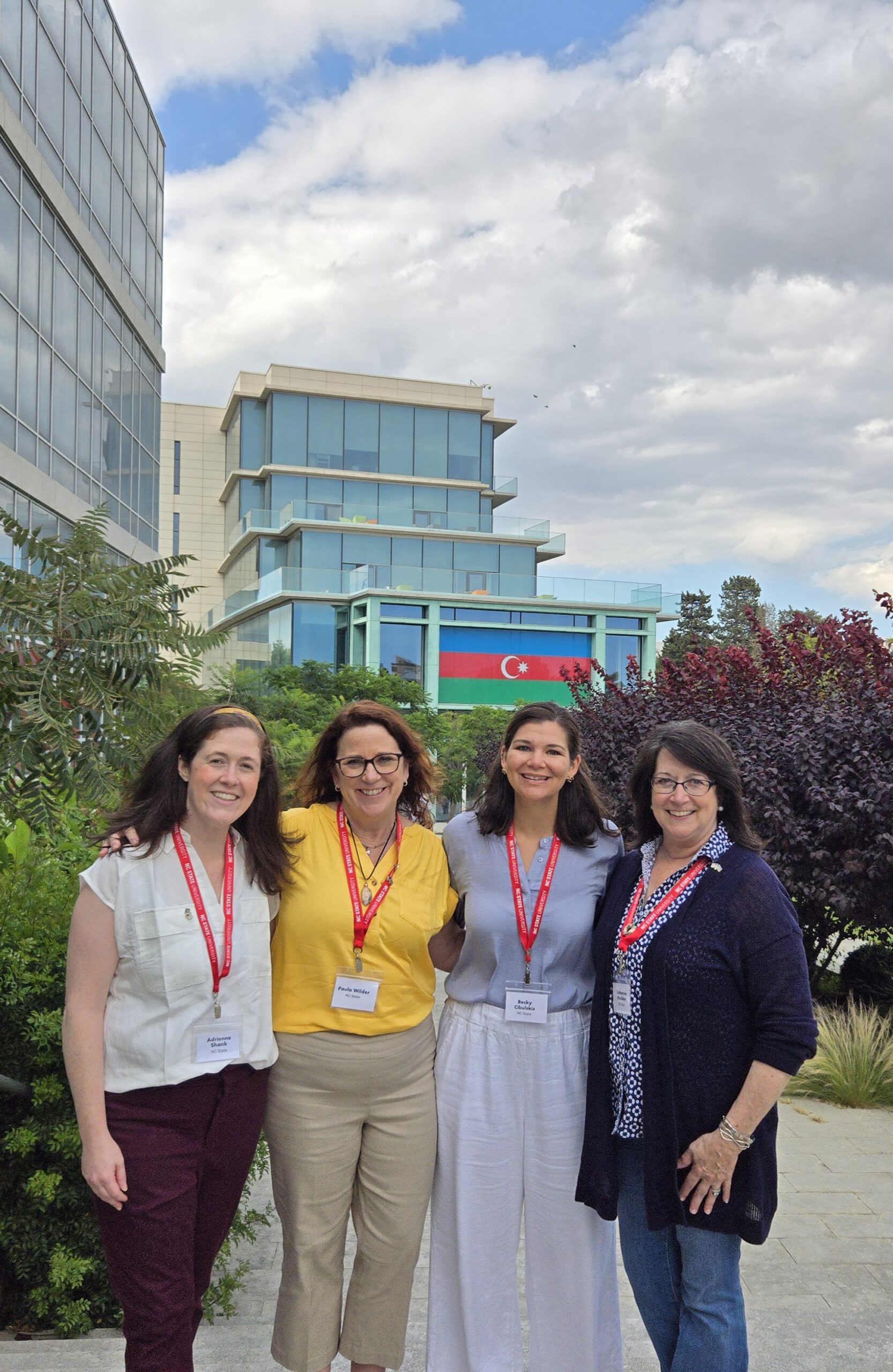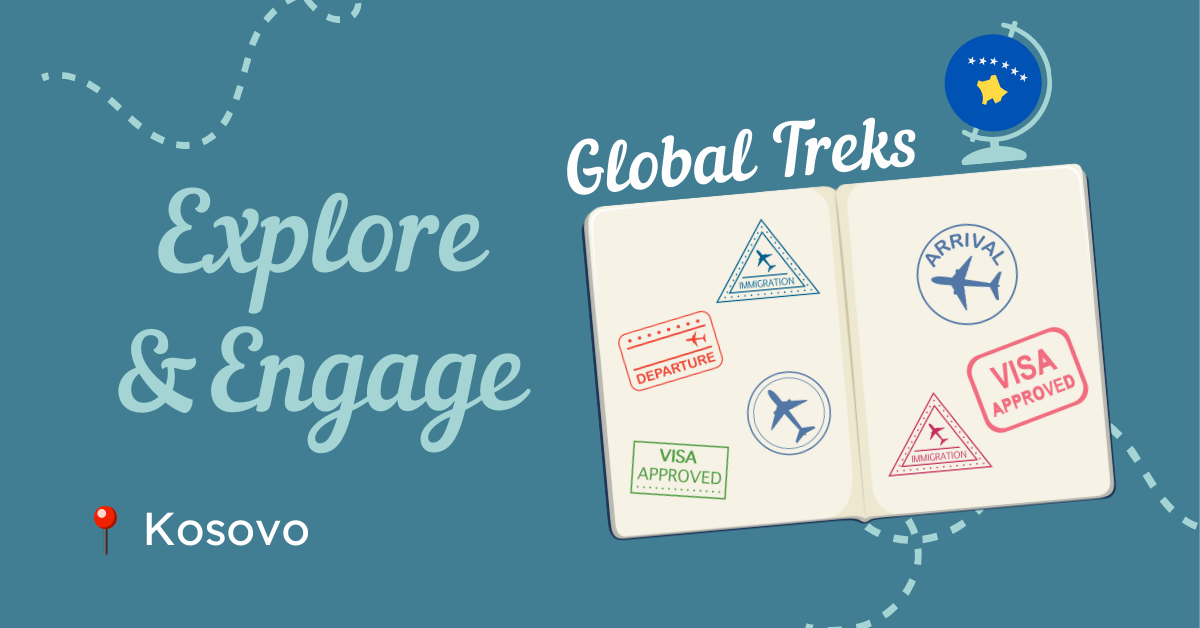Global Treks: Back to Baku, Republic of Azerbaijan
The U.S. Embassy in Baku invited NC State University to host an in-person conference for English teachers for the third year this past summer. We are starting to build our cultural knowledge of this brilliant and rich society as we build more relationships and connect on-the-ground in Azerbaijan.

In June 2024, Adrienne Shank, Paula Wilder, Becky Cibulskis, and Cate Madden spent five days in Azerbaijan to host a professional development conference for English language teachers. Hosted at ADA University and funded by the U.S. Embassy in Baku, the three-day conference showcased presentations from 80 Azerbaijani teachers, five U.S. American educators, and several non-profit and governmental organizations which support teachers in Azerbaijan.

Program Highlights
Since January 2021, GTI has trained more than 350 English language teachers in Azerbaijan through a rigorous online course focused on language teaching pedagogies. Our role is not only to introduce resources and references that the teachers can practically apply for improved student outcomes, but to understand the social-political context which influences the traditional teaching style in Azerbaijani classrooms – an impossible task to achieve through Zoom alone. For the third year in a row, we’ve been able to meet with teachers and administrators in their own cultural context and understand the limitations of our own cultural preferences and assumptions in improving English language instruction in Azerbaijan.
After 28 hours of travel through five airports due to an unfortunate series of delays, our team commenced our five-day itinerary, starting on the first day with a visit to the U.S. Embassy in Baku to discuss continued partnership in support of English language teachers.
Day 2 offered the opportunity to see the beautiful grounds of ADA University, the esteemed diplomatic university which hosts our event. Presenting teachers used this time to prepare and practice their presentations and to connect in person with one another, most meeting for the first time outside of Zoom. Many teachers travelled from regions and villages far from Baku to participate in their first professional conference.
Led by GTI’s Becky Cibulskis, Day 3 kicked off with the official conference welcome from university and U.S. government officials. It was incredible to have the conference covered on several Azerbaijani news outlets – we could feel the positive impact being shared! Teachers attended workshops led by U.S. educators and Peer Mentors, alumni of the program who have supported the participating teachers in this year’s cohort through every step of the process. After a full day of workshops and poster presentations, the NC State team was invited to attend the U.S. Embassy’s Independence Day celebration, including an informal meet-and-greet with the U.S. Ambassador to Azerbaijan.
.jpg)
Fun Fact: Did you know that Azerbaijan was the winner of the 2011 Eurovision contest? Eldar Gasimov, representing the winning duo, was among the Embassy attendees, and he embodied the welcoming spirit that is so ever-present in Azerbaijan.
Day 4 was the time for the 2024 ELT cohort to shine. The teachers who completed this year’s program shared their skills and expertise with more than 300 attendees at the conference held at ADA University. There was an overwhelming sense of joy and collaboration as presenters and attendees discussed pedagogical theory and hands-on practical application with regards to their unique professional experiences teaching English in Azerbaijan.
Conference Highlights
Our final day in Azerbaijan allowed the NC State team to explore a little beyond the capital city of Baku including multiple sites on the Absheron Peninsula relating to Azerbaijan’s notoriety as Odlar Yurdu, the “Land of Fire.” First, we visited the Yanar Dagh, or “burning mountain”, where natural gas has caused a perpetually burning fire that is never extinguished. Next, we walked through Balaxani, site of the world’s first oil-distilling factory. Current inhabitants of the village have revitalized its appearance with murals depicting daily life, historical moments and the many natural landscapes of Azerbaijan. Finally, explored the Ateshgah (“fire temple”), a historical place of worship important in Zoroastrian, Sikh, and Hindu traditions. All of these sites combined allowed us to really get a sense of the rich cultural traditions and historical elements that have played a large role in creating the welcoming atmosphere that is apparent in modern-day Azerbaijan.
Our time in Azerbaijan may have been short, but we learned so much throughout the week. The hospitality displayed by the Embassy, ADA University, and of course, the incredible English teachers was a highlight of the program culmination on-the-ground in Baku.
So, will you be adding Azerbaijan to your travel bucket list? If you do, don’t miss out on the historical sites and museums, restaurants, and the incredible local textiles that are hand-made in Old City. While there, remember to take a moment to sit by the Caspian Sea to take in the natural beauty of the Land of Fire.
Trip Highlights
Cultural Highlights
1. Nuş olsun!, like “bon appetit,” is always expressed as you start to enjoy your meal! Azerbaijan does not export goods far outside of the Commonwealth of Independent States (CIS), so you’ll have to travel there to experience the rich cuisine and incredibly fresh flavors. Like their friends in Turkey, Azerbaijani people generally prefer tea to coffee and practice a social ceremony when sharing tea with friends or colleagues. Plov and Dolma were among the local specialties served to our visiting delegation.
2. Nar – The Pomegranate is a symbol of the country’s multiculturalism and religious tolerance that has become part of the fabric of Azerbaijani culture. Like the Ateshgah Temple which hosted various religious practitioners over the centuries, Azerbaijan is situated at the geographic intersection linking East and West, North and South. The pomegranate is the “fruit of the king and the king of the fruits” in Azerbaijan, its hundreds of seeds representing hundreds of different tribes and cultures, all sharing one home.
3. Symbols like Buta (paisley), the Xarı bülbül (a type of orchid) and the prevalence of the flag all contribute to a palpable and unifying national identity in Azerbaijan. Despite existing as a part of many larger societies such as the Persian, Ottoman or Soviet empires, Azerbaijan has maintained some unique linguistic and cultural identity that unites its citizens to this day. The flag’s 8-pointed star represents the unification of 8 branches of Turkic tribes, and its colors speak to key cultural identities (green = Islam, blue = Turkic, red = modernization).
4. Look out for more about Azerbaijan as they prepare to host the 2024 UN Climate Change Conference, COP29 in November. Azerbaijan has clearly embraced its historical identity as the “Land of Fire” due to its ample resources of oil and natural gas. In fact, the world’s first drilling of an oil well in 1846 took place just outside of Baku, and is now a noted historical landmark and tourist attraction in the country. Still, 21st century leadership demands a balanced orientation between the past and the future, and we are excited to see Azerbaijan’s cultural contributions on this global political stage.
- Categories:


